New start, new platform and new landscape
Expedite local legislation Resolve problems at root and get back on track
4 April 2021
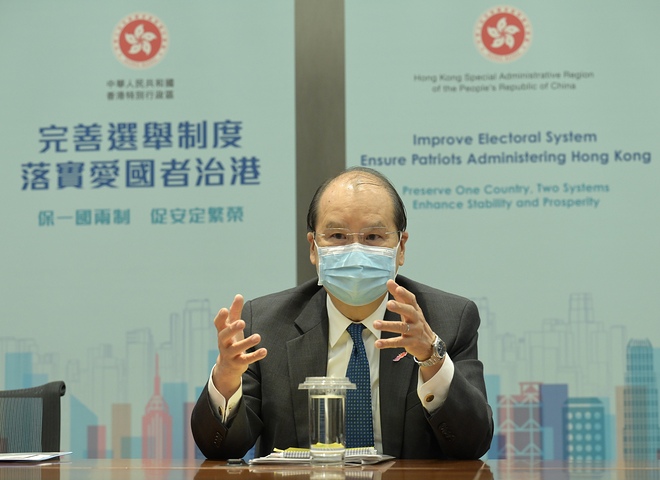
|
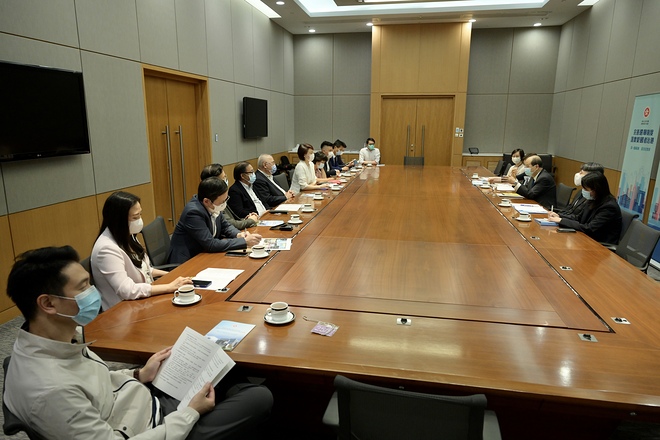
|
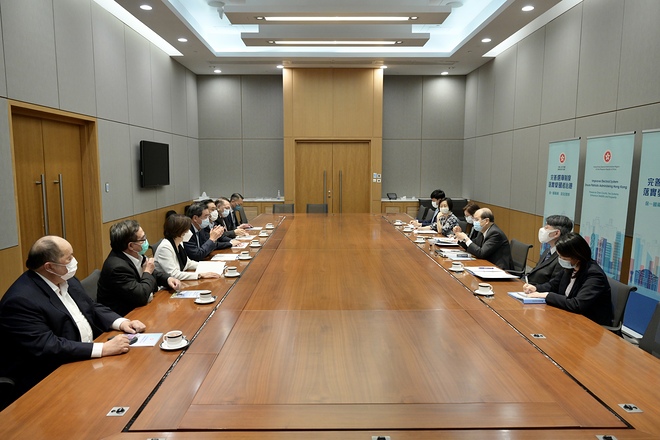
|
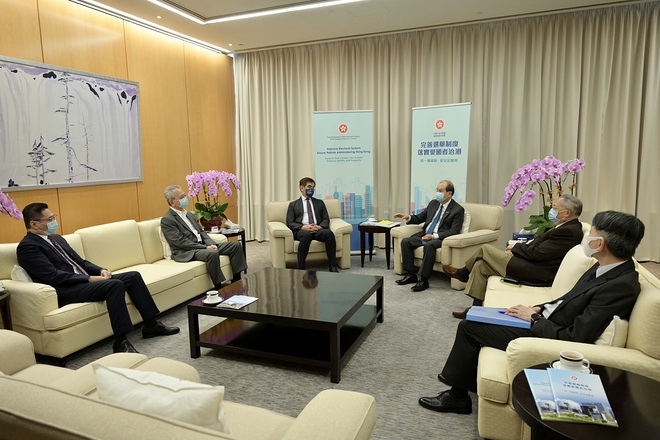
|
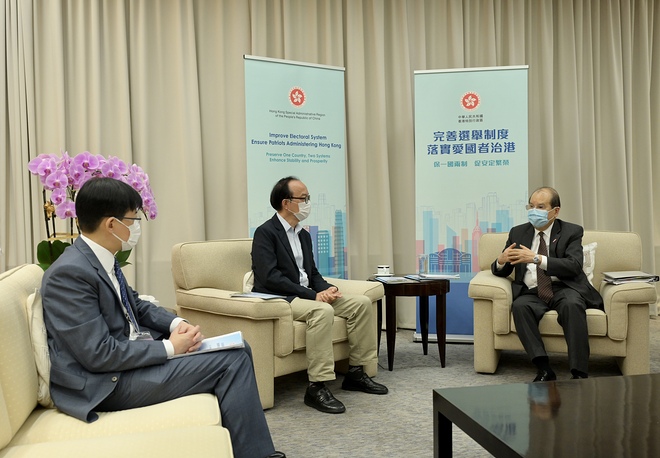
|
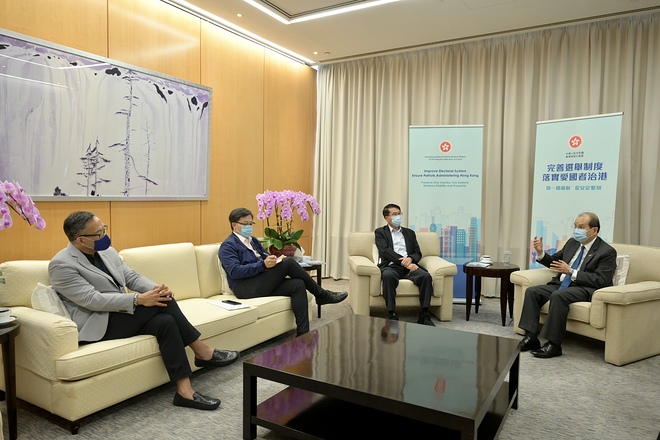
|
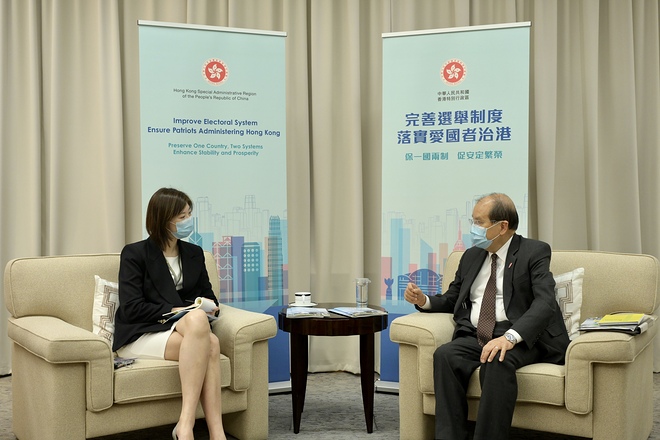
|
At a session held last Tuesday (March 30), the Standing Committee of the National People’s Congress (NPC) unanimously approved the newly amended Annex I to the Basic Law on Method for the Selection of the Chief Executive (CE) of the Hong Kong Special Administrative Region (HKSAR) and Annex II to the Basic Law on Method for the Formation of the Legislative Council (LegCo) of the HKSAR and its Voting Procedures.
The NPC’s approval of the amendments to improve the HKSAR’s electoral system has profound and far-reaching meaning. Not only will it facilitate the full and faithful implementation of “One Country, Two Systems”, enforce the fundamental principle of “patriots administering Hong Kong” and safeguard national sovereignty, security and development interests, it will also help Hong Kong’s political system make a new start, creating a new platform and a new landscape for Hong Kong’s constitutional development.
Improve the electoral system to put an end to chaos
Safeguarding political stability and security of the political regime is a matter of paramount importance. The implementation of the National Security Law in Hong Kong has filled its gaping hole in national security and restored its social stability. Nevertheless, if the loopholes of our electoral system are left unplugged, parties which oppose the Central Authorities and stir up disorder in Hong Kong can enter our governance structure through these loopholes, posing threats to national security, sovereignty and development interests as well as undermining the principle of “One Country, Two Systems”.
Following the improvement of the electoral system, Hong Kong can be freed from the shackles of political wrangling, get out of the political swamp and start a new chapter of good administration and governance. A stronger collaboration between the executive and the legislature will also enhance our governance efficacy, enabling Hong Kong to focus on developing the economy and improving people’s livelihood.
Broad representation to demonstrate balanced political participation
The Election Committee (EC) is at the core of the improvements to our electoral system. With adjustments to its formation, the EC will be composed of 1 500 members from five sectors of 300 members each, an expansion from 1 200 members from four sectors.
Among the five sectors, the first and second sectors, namely “Industrial, commercial and financial sectors” and “The professions”, are existing ones. The third sector, i.e. “Grassroots, labour, religious and other sectors”, is aimed to enhance the broad representation of the EC with the addition of grassroots representatives. The fourth sector, i.e. “Members of the LegCo, representatives of district organisations and other organisations”, is more or less unchanged except for the inclusion of more representatives from district organisations. The fifth sector comprises “HKSAR deputies to the NPC, HKSAR members of the National Committee of the Chinese People’s Political Consultative Conference and representatives of Hong Kong members of relevant national organisations”. All in all, the expanded EC can better represent the overall and fundamental interests of the Hong Kong society with more representatives from different sectors and strata.
To ensure the broad representation of candidates for CE, there is an additional requirement in the new electoral system which requires any CE candidate to secure not less than 15 nominations from each of the five EC sectors. These five sectors are not only broadly representative but also widely accepted by the public.
In addition to nominating and electing the CE, the EC will also be endowed with the new function of nominating candidates for the LegCo election and electing some of the legislators. This will help enhance and ensure the balanced and orderly political participation of the community.
Executive-led administration and enhanced efficiency of the legislature
As regards the LegCo, the increase in the number of seats from 70 to 90 will enhance the representation of public opinion in the legislature. Apart from the past practice of having members returned by geographical constituencies (GC) through direct elections and by functional constituencies (FC), there will be a new group of members returned by the EC. The proportion of this group of members is larger than the others in order to facilitate executive-led administration and good governance.
The changes in the FC sectors and elector eligibility will enable broader representation of sectoral interests for more balanced political participation. As regards GC direct elections, the current proportional representation system will be replaced by a “double seats and single vote” system with the re-delineation of constituencies.
Confirmation of candidate eligibility
The amendments made by the NPC Standing Committee also include establishing a Candidate Eligibility Review Committee (CERC) which shall be responsible for reviewing and confirming the eligibility of candidates for members of the EC, CE, and members of the LegCo. In fact, eligibility review is not a new procedure but has all along been conducted by a returning officer.
The Committee for Safeguarding National Security of the HKSAR shall, on the basis of the review by the department for safeguarding national security of the Police Force, make findings as to whether a candidate for member of the EC, CE or member of the LegCo meets the legal requirements and conditions of upholding the Basic Law and swearing allegiance to the HKSAR, and issue an opinion to the CERC in respect of a candidate who fails to meet such legal requirements and conditions. No legal proceedings may be instituted in respect of a decision made by the CERC on the eligibility of a candidate pursuant to the opinion of the Committee for Safeguarding National Security.
Improving the electoral system is obviously a step forward in advancing Hong Kong’s democracy. It is by no means “a retrogression of democracy” as some ill-intentioned people have described it with wanton distortion or defamation. I would like to reiterate that the improvements to Hong Kong’s electoral system by the Central Authorities “have not changed a single word” in Article 45 of the Basic Law concerning the method for selecting the CE and Article 68 of the Basic Law concerning the method for forming the LegCo. Neither have they changed the ultimate goal of achieving universal suffrage.
All-out efforts to enact legislation
To ensure the smooth completion of “Decision plus Amendment”, the HKSAR Government will fully co-operate with the NPC in implementing the newly amended Annexes I and II to the Basic Law by taking a three-pronged approach:
- Conduct briefing sessions: As the Chief Secretary for Administration, I am working hard with the governing team and the civil service to brief the community on the matter. During the six briefing sessions held last Wednesday and Thursday, I met the majority of the LegCo Members in groups and explained the matter in detail to seek their support for local legislation. Such briefing sessions will continue next week.
- Local legislation: The HKSAR Government is pressing ahead at full steam with the amendment of local laws to incorporate the specific contents of the amended Annexes I and II to the Basic Law into over 20 primary and subsidiary legislations. We will do our utmost to table a bill for scrutiny by the LegCo in mid-April.
- Organise elections: There will be three elections in Hong Kong in the coming twelve months, i.e. the EC, LegCo and CE elections. Our goal is to have the bill scrutinised and passed by three readings in the LegCo by the end of May to allow time for the voluminous preparatory work for the elections, including a voter registration exercise in June 2021, the EC subsector elections in September 2021, the seventh LegCo general election in December 2021 and the CE election in March 2022.
Conclusion
Having in mind the overall and fundamental interests of Hong Kong as well as the steadfast and successful implementation of “One Country, Two Systems”, the Central Authorities have taken a visionary approach to strategically and swiftly crack the tough nut of the city’s constitutional development, political stability and authority, thereby ensuring the well-being of its 7.5 million people. With our electoral system improved and political stability to follow, we can focus our efforts on fostering development, improving people’s livelihood, enhancing our governance capability and resolving a host of deep-seated problems besetting Hong Kong.
The country is our strong backing. As long as we are persistent in capitalising on our unique strengths to serve the country’s needs, proactively integrating into the overall national development, and harnessing the vast opportunities arising from the country’s 14th Five-Year Plan and the development of the Guangdong-Hong Kong-Macao Greater Bay Area, Hong Kong could surely ride the wave and unlock its huge potential to scale new heights.
It goes without saying that Hong Kong has to emerge from the pandemic as soon as possible to get back on track and open up a new landscape for development. COVID-19 vaccination is the best solution to fight the virus. Once again, I appeal to members of the public to actively participate in the COVID-19 Vaccination Programme to protect themselves and others.
I would also like to take this opportunity to remind the public that during the long holidays of Easter and Ching Ming Festival when they leave home for tomb-sweeping or other activities, they should stay vigilant at all times, strictly comply with the social distancing measures and wear a mask, as well as avoid going to crowded areas. If people let down their guard while enjoying the holidays, there will likely be a rebound of the epidemic and what we have achieved in combating the virus thus far will be wasted.

